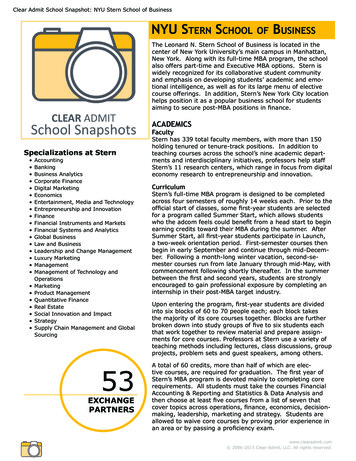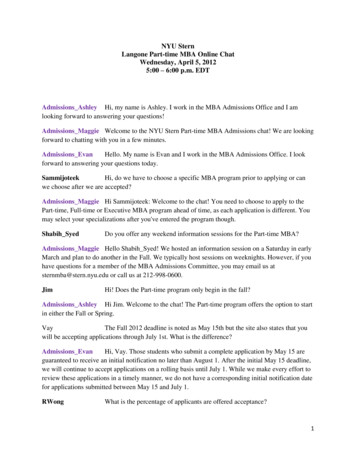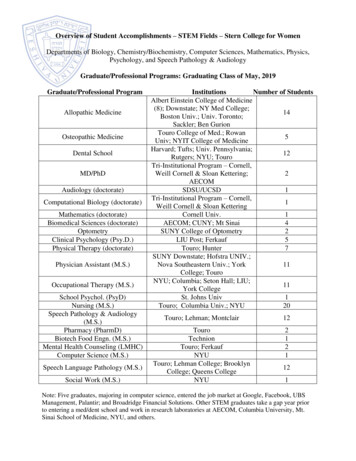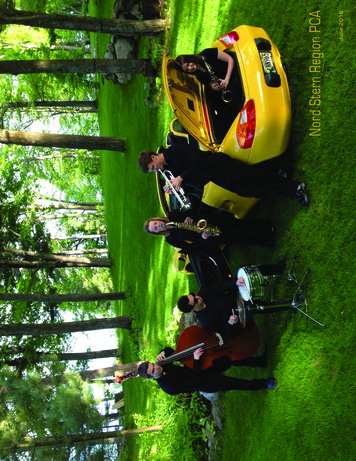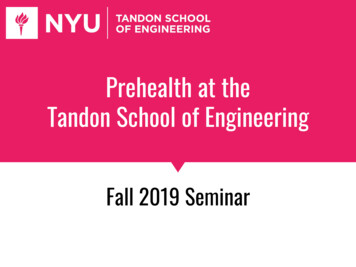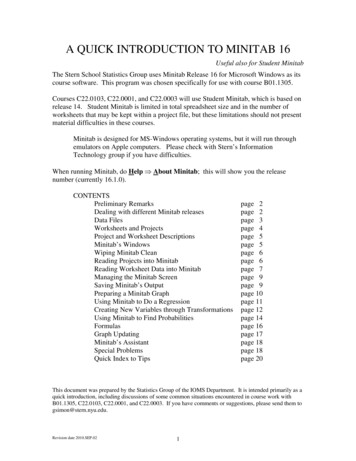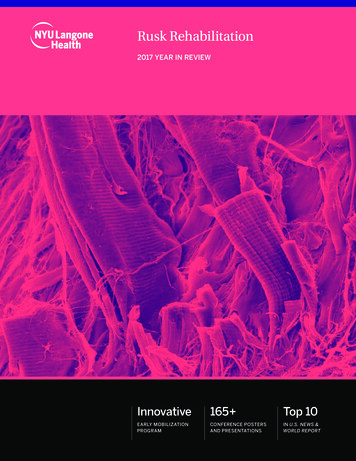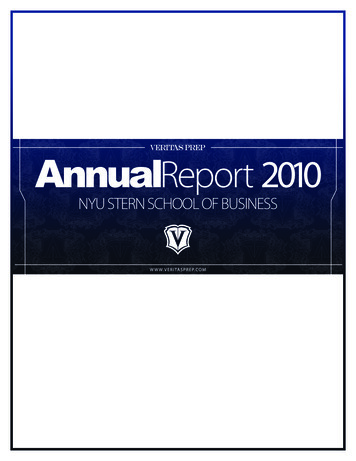
Transcription
NYU STERN SCHOOL OF BUSINESS
AnnualReport 2010NYU Stern School of BusinessAboutNYU’sSternSchoolofBusinessOne of the world’s premier management education institutions, NYU’s SternSchool of Business is a collaborative community of energized and entrepreneurialindividuals. Located in the heart of New York City, the school benefits from its multitude of intellectual, commercial, cultural, and human resources. Stern students,alumni, faculty, and staff members are passionate about their school, and thereis a never-ending discussion of how to continuously improve, push forward thestate of the art, and clearly demonstrate to the outside world the school’s myriadstrengths and differentiating factors.AcompletelistoftheNYUschoolsincludes:Arts and ScienceCollege of DentistryCollege of NursingCourant Institute ofMathematical SciencesIn some ways, the school’s story is analogous to that of its benefactor and namesake Leonard N. Stern, the billionaire son of the German immigrant founder ofthe Hartz Mountain Pet Company. The Stern School’s roots trace back to NYU’sSchool of Commerce, Accounts and Finance, which was founded in 1900 and followed shortly thereafter by the graduate program, which was founded in 1916and based in downtown Manhattan. The “Wall Street Division” of the school wasin close proximity to the many financial institutions whose past, present and future employees made up a large component of the student body – a connectionthat significantly influenced the school’s focus and culture, supporting its longtime distinction as a “finance school.” In 1992, following a 30 million landmark giftfrom Stern, the launching of an innovative and diverse new core curriculum, andthe design and construction of a state-of-the-art facility, the undergraduate andgraduate programs were consolidated at NYU’s Washington Square campus andthe MBA program’s rankings and reputation ascended to an all-time high.Gallatin School ofIndividualized StudyNow named consistently among the top 10 or 15 schools worldwide by all theprominent compilers of MBA program rankings, and recognized across its variousdisciplines, Stern offers a number of MBA degree alternatives. Stern’s full-time MBAprogram, #1 ranked Langone part-time program, multiple Executive MBA options,and broad-based Ph.D program all reflect the school’s first-rate faculty, its superiorresearch expertise, its impressive network of corporate relationships, and its activeand committed alumni. Across all of its various programs, Stern lives and breathesits commitment to being “a progressive, forward-looking, merit-based institution,deeply committed to diversity, opportunity, innovation and excellence.”School of Continuingand Professional StudiesNYUProgramsStern’s Graduate School of Business is one of many prestigious NYU programs, allof which have benefitted in recent decades from New York City’s soaring popularity as a venue to live, work, and visit. The brightest stars in the constellation of NYUprograms include the consistently top five-ranked law school, the Wagner School ofPublic Service, the Tisch School of the Arts, and the Courant Institute of Mathematical Sciences. These and other programs at NYU boast world-class faculties, facilities,and resources, and benefit greatly from their vibrant New York City locations.01Institute of Fine ArtsInstitute for the Studyof the Ancient WorldLeonard N. Stern School of BusinessNYU Abu DhabiPolytechnic Institute of NYURobert F. Wagner Graduate Schoolof Public ServiceSchool of LawSchool of MedicineSilver School of Social WorkThe Steinhardt School ofCulture, Education, andHuman DevelopmentTisch School of the ArtsA B O U TN Y US t e r n
AnnualReport 2010NYU Stern School of BusinessTheSternSchoolofBusinessStern is widely known as one of two world-class business schools in New YorkCity, but often considered more specialized in finance and known to be “scrappier”than Columbia Business School, its uptown, Ivy League counterpart. After 15 yearsof focused commitment to rounding out and strengthening its MBA program tomatch its Henry Kaufman Management Center facility and powerhouse researchfaculty, Stern continues to push forward with new and continuing initiatives. Therecently announced Concourse Project, aimed at tying the entire business schoolcomplex together into one state-of-the-art facility, is a good example. Amongthe many notable aspects of the Stern program are its internationalism andentrepreneurialism, the diversity of its incoming classes, its strong connection tothe New York City community, the close-knit and cooperative spirit of its studentbody, its many institutional partnerships and alliances, and its strong alumni andcorporate recruitment networks.The multiple MBA options offered by the Stern School – full-time, part-time,various EMBA programs – ensure that the student body is both broad and deepin terms of its collective work experience, diversity, and post-MBA goals andaspirations. Consistent with this approach, Stern offers one of the most extensivelists of elective courses of any business school. The Stern experience is alsoenhanced by MBA students’ ability to earn joint degrees or take classes in otherNYU graduate programs, for example, in pursuit of the JD/MBA degree or classesin Health Care Administration at the Wagner School of Public Service. Furthermore,the extensive list of adjunct faculty, visiting scholars, and executives-in-residencewho complement the faculty of the various departments brings experienced andinsightful practitioners into the community.The Stern faculty and administration are agile and responsive, as evidenced by thethought leadership provided during the current global financial crisis; by the firstquarter of 2009, a major collaborative effort by 33 faculty members had resultedin 18 broadly distributed policy “white papers” and a published book on thefinancial crisis, as well as a course offered by the white paper authors (which wasoversubscribed in a few hours when offered for registration). A major event relatedto the book, held for alumni and the media and leveraging Stern’s relationshipsto panelists the likes of Paul Volcker and Myron Scholes, is now being extendedinto a series of discussions and lectures. As Dean Thomas Cooley—who will bereplaced by Stanford economics professor Peter Blair Henry in January 2010 —notes regarding Stern:“Stern is widely known as one oftwo world-class business schools inNew York City, but often consideredmore specialized in finance andknown to be ‘scrappier’ thanColumbia Business School, itsuptown, Ivy League counterpart.”“By the first quarter of 2009,a major collaborative effort by33 faculty members had resultedin 18 broadly distributed policy‘white papers’ and a publishedbook on the financial crisis.”“The high degree of intellectual activity assures that students aretaught to think analytically, critically, and ethically and to bring ahistorical perspective to their analysis. Consequently, students are wellequipped to keep pace with a rapidly changing business world.”02A B O U TN Y US t e r n
AnnualReport 2010NYU Stern School of BusinessTheSternApproachThe Stern School’s stated mission – “to deliver the highest quality managementeducation to the brightest business students in a dynamic environment of mutuallearning, teamwork and support, to advance the frontiers of business knowledgeby fostering creative, cutting-edge research, and to leverage to the maximum extent our vital connection to New York City-our home, campus, classroom, and laboratory” – is evident in its approach to delivering its MBA programming, which aimsto balance theory and conceptual frameworks with practical application. A solidbase of management skills is built through required core courses, and students canthen build on that knowledge through specialized electives.Generally speaking, the Stern MBA program emphasizes the school’s commitment to:Real-World Perspective in its New York City Home. Leveraging its physical location at the heart of New York City, Stern strives to encompassall of the dynamic energy of the “world’s business capital” in its MBA programs.The Stern School prides itself on its real-world approach to business education,and on the balance the school’s programs provide between theoretical learningand practical, “roll-up-your-sleeves” engagement in the broadly defined businesscommunity. For example, a case study developed by now Distinguished ServiceProfessor of Management Emeritus Richard Freedman on New York’s MetropolitanOpera has given numerous students open access to and in-depth understandingof the venerable institution (and a great chance to soak up some culture, to boot!).In fact, the Metropolitan Opera is just the tip of the iceberg, as Stern has rolled outa program called New York City Cases, which puts students in a variety of highprofile and interesting scenarios. Designed as a large group platform, each NewYork City Case invites 200 students to an area organization, where they will soak upa “day in the life” at that place of business (one example is going to the Steinbergpiano company, where students watch how the pianos are assembled), and thengo through a panel Q&A session before being presented with a specific problemto address in the form of a team analysis paper. Cases can be any subject matter,but often focus on marketing, operations, or strategy.Highly Diverse, Yet Highly Collaborative Community. Stern isproud of the exceptional diversity of its student body, and students thrive in therich, multicultural environment it affords; the school publicizes the fact that it hasa student body representing over 50 different nationalities and has long enjoyedgreater ethnic and racial diversity than other comparable programs, as well as ahigher percentage of women. Despite the fact that over half of its students in anygiven year are aiming for post-MBA employment in a finance-related sector, Sternis by no means one-dimensional in terms of its academics, nor is it looking forcompetitive “lone stars” to feed into the banking industry. Participation in studentorganizations is prolific, with most students involved in two or more. Academiccollaboration is a cornerstone of the Stern programs, and students actively engagewith each other and with the faculty, administration, and staff in all aspects ofthe MBA experience. In fact, many prospective students who visit the campus aresurprised at the high degree of collaboration and mutual support between Sternclassmates and within the broader community, even relative to other comparableprograms.03“The Stern School’s stated missionis to deliver the highest qualitymanagement education to thebrightest business students in adynamic environment of mutuallearning, teamwork and support, toadvance the frontiers of businessknowledge by fostering creative,cutting-edge research, and toleverage to the maximum extentour vital connection to New YorkCity-our home, campus, classroom,and laboratory.”“Each New York City Caseinvites 200 students to an areaorganization, where they willsoak up a ‘day in the life’ at thatplace of business.”A B O U TN Y US t e r n
AnnualReport 2010NYU Stern School of BusinessBroad-based and Balanced MBA Curriculum. Although it is bestknown for its finance department, Stern takes a balanced and general approachto management education. In their first year, MBA students are required to study arigorous core curriculum covering all fundamental areas of business. In the secondyear, students can customize the Stern curriculum to meet specific academic andprofessional goals, including through choosing up to three specializations (or noneat all), taking electives during the day or in the evening with students from the parttime MBA program, leveraging one of the many study abroad offerings, or registering for elective courses at other NYU graduate schools.An Oasis for Career Changers. Stern is considered one of the best possible destinations for “career changers” – students who are interested in moving fromone field to another by way of their MBA education. This is often seen as a positivein an applicant, as Stern is one of the few business schools with a program tailoredto such candidates. The Industry Mentoring Initiative (IMI) allows Stern students toapply for a very unique mentoring program that puts career changers into actualcompanies to learn about a new industry or function and to make strong inroadsinto that world through networking. It is a competitive application process and onethat that requires a clear move from one career to another, but for those studentswho participate, it can be a lifesaver. The IMI program features tracks in six different industries: consulting, luxury and retail, marketing, media and entertainment,investment banking, and sales and trading.Relevant Course Content and Evolving Teaching Methodology.Stern’s teaching methodology particularly emphasizes team projects, case studies,experiential learning, and lectures. The school’s strong research emphasis is evidentin class content, which is regularly updated to reflect relevant developments in thebusiness world as well as Stern’s belief in the integration of MBA subject matter. Thehighly engaged (and engaging) professors encourage students to challenge theirassertions and create a healthy back-and-forth in the lecture halls and classroomson a daily basis. The world outside the classroom serves as a very real and regularvenue for testing skills and theories, with opportunities like studying a local company as the basis for a group project, advising New York City non-profits throughthe Stern Consulting Corp (SCC), making investment decisions through the MichaelPrice Student Investment Fund, and obtaining funding for a new venture throughthe annual Entrepreneur Business Plan Competition, which is open to one and all.04“Stern is considered one of thebest possible destinations for‘career changers’ – students whoare interested in moving from onefield to another by way of theirMBA education.”“Many prospective students whovisit the campus are surprised atthe high degree of collaborationand mutual support betweenStern classmates.”A B O U TN Y US t e r n
AnnualReport 2010NYU Stern School of rn typically requires three standard essay questions and then allows each candidate to answer an optional question (althoughplease note that these essay questions differ among the various MBA programs).For 2008-2009, the essays on the Stern full-time MBA application were as follows:12Professional Aspirations (750 words)Think about the decisions you have made in your life. Answer the following:a. What choices have you made that led you to your current position?b.c.What is your career goal upon graduation from NYU Stern? What is your long-term career goal?Your Stern Experience (500 words)We take great care to shape the Stern community with individuals who possess both intellectual and interpersonalstrengths. We seek individuals who are highly intelligent, collaborative, and committed to flourishing as Stern leaders. Pleaseanswer the following questions:a. What is your personal experience with the Stern community? Tell us what actions you have taken to learn about us.b.c.3Why pursue an MBA at this point in your life?Describe what most excites you about Stern from both an academic and extracurricular perspective.How do you anticipate making your mark on the Stern community? Be specific about the roles you will take on and theimpact you hope to achieve.Personal ExpressionPlease describe yourself to your MBA classmates. You may use almost any method to convey your message (e.g. words,illustrations)*. Feel free to be creative.Please do not submit anything that must be viewed or played electronically (e.g. CDs, DVDs, MP3s, online links), that isperishable (e.g. food) or that has been worn (e.g. used clothing). If you submit a written essay, it should be 500 words maximum,double-spaced, 12-point font. If you are not submitting Essay 3 online, you are required to upload a brief description of yoursubmission in your online application.Note: While NYU’s Personal Expression essay may still be submitted in many different forms (for example, written word, illustrations,or sculptures), the school has been steadily imposing more guidelines, as evidenced above: electronic submissions as well as food andclothing are now prohibited. Candidates can gain more insight into “Essay 3” by listening to Isser Gallogly, Executive Director of MBAAdmissions, on Public Radio’s “Marketplace,” but should note that restrictions have changed since the segment first aired.4Additional Information (optional)Please provide any additional information that you would like to bring to the attention of the Admissions Committee.This may include current or past gaps in employment, further explanation of your undergraduate record or self-reportedacademic transcript(s), plans to retake the GMAT and/or TOEFL or any other relevant information. If you are unable to submita recommendation from a current supervisor, you must explain your reason in Essay 4. If you are a re-applicant from last year,please explain how your candidacy has improved since your last application. If you are applying to a dual degree program,please explain your decision to pursue a dual degree.Veritas Prep clients working on their Stern applications will receive expert guidance on each of these essay questions, to enablethem to communicate in their own words and sentiments their fit with the school and its community. Head Consultants help clientsunderstand how to highlight strengths and weaknesses as well as unique elements within the confines of the question, while alsoaddressing each of the key business school admissions themes. Furthermore, Stern Specialists will help clients decide whether tomake use of the optional essay (Stern actually strong encourages using Essay 4 to address any issues, rather than trying to weavethem into other essays), how to embrace both the freedom and the challenge presented by Essay 3, and will ensure that all essayresponses are in keeping with what NYU is looking for in its applicants and that the program highlights included in this guide areused as appropriate reference points and examples.05A d m i ss i o nsatN Y US t e r n
AnnualReport 2010NYU Stern School of BusinessAdmissionsCriteriaAdmissionsStatisticsTwo decades ago, upon receiving Leonard N. Stern’s transformative naming gift of 30 million, the Stern School implemented an initiative to attract the elite caliber ofstudent that would support its ambitious goals. Since that time, the profile of theaverage Stern MBA student has strengthened significantly, and admissions criteriahave become increasingly stringent. As the school’s informational materials put it,“the students entering Stern today are the brightest, best prepared in its history.”Stern’s admissions statistics are what youwould expect from a top 15 business school.Stern annually receives approximately 10 timesas many applications as there are seats in theclass, which is on par with other elite programs.The Stern School’s admissions committee claims to evaluate each candidate “holistically,” paying careful attention to three clearly defined factors:Academic Potential. Students should be “confident in their ability to master the required material and excel in the classroom,” and are assessed based onpast academic performance (as well as the institutions they attended) and general aptitude as measured by the GMAT. Successful candidates come from a widerange of academic backgrounds, and Stern has no minimum GMAT score or GPArequired of applicants, and will only consider an applicant’s highest GMAT score.Professional Achievements and Aspirations. Students who will“share their experiences with classmates and perform as future business leaders”are valued at Stern. Therefore, students who have interesting and significant workexperiences and who
at all), taking electives during the day or in the evening with students from the part- time MBA program, leveraging one of the many study abroad offerings, or register
